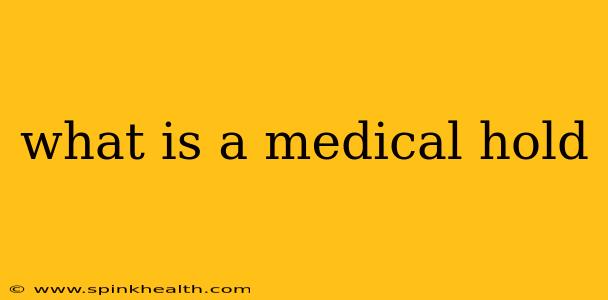What is a Medical Hold? A Deep Dive into Unexpected Hospital Stays
Imagine this: you're feeling unwell, go to the hospital, receive treatment, and then… you can't leave. This isn't a horror movie; it's the reality of a medical hold, a situation that can be confusing and even frightening for patients and their families. Let's unravel the mystery behind medical holds, exploring what they are, why they happen, and what you can expect.
My own experience with a family member facing a medical hold illuminated just how jarring this situation can be. The initial diagnosis was concerning, but the subsequent inability to go home felt like a sudden, unwelcome twist. Understanding the process—the "why"—became crucial in navigating a stressful and uncertain time.
What exactly constitutes a medical hold?
A medical hold, also sometimes called involuntary commitment or a psychiatric hold, is a temporary detainment of a person for medical evaluation and treatment. It's not about punishment; it's about ensuring the individual's safety and well-being. The hold is initiated by a healthcare professional who believes the person poses a significant risk of harm to themselves or others, or is gravely disabled—unable to provide for their basic needs.
This isn't a decision taken lightly. Strict legal guidelines and procedures govern medical holds, varying slightly by jurisdiction. Generally, a doctor's assessment is required to initiate the hold, often supported by observations from nurses, social workers, or other medical staff.
What are the grounds for a medical hold?
The criteria for a medical hold center on the individual's risk of harming themselves or others. This could involve:
- Suicidal ideation or attempts: Expressing thoughts of self-harm or making a suicide attempt.
- Homicidal ideation or threats: Exhibiting thoughts of harming others or making specific threats.
- Severe mental illness causing significant impairment: A condition like schizophrenia or bipolar disorder impacting daily functioning to the point of danger.
- Grave disability: Inability to meet basic needs like food, shelter, or hygiene due to mental illness.
- Substance intoxication or withdrawal: A severe level of intoxication or withdrawal symptoms posing a risk to the individual's health or safety.
It's important to note that these are general examples; the specific criteria may vary depending on local laws and the individual circumstances.
How long does a medical hold typically last?
The duration of a medical hold varies widely depending on several factors including the individual's condition, response to treatment, and local regulations. It could range from a few hours to a few days, sometimes even longer in more complex cases. Regular evaluations are conducted to assess the person's condition and determine whether the hold remains necessary.
What happens during a medical hold?
During a medical hold, individuals receive a thorough medical and psychiatric evaluation to determine their diagnosis and the level of care required. This can include interviews, physical examinations, and various assessments. Treatment may involve medication, therapy, and other interventions aimed at stabilizing the individual's condition and reducing the risk of self-harm or harm to others. While the exact procedures will vary, the goal is always to ensure the person's safety and facilitate their recovery.
What are my rights during a medical hold?
Even under a medical hold, individuals retain certain fundamental rights. These rights typically include the right to:
- Legal counsel: To speak with a lawyer.
- Contact with family and friends: To communicate with loved ones.
- Refusal of treatment (with certain exceptions): To refuse specific treatments, though this might be limited if the person is considered a danger to themselves or others.
- Regular review of the hold: To have the necessity of the hold regularly reassessed by a healthcare professional.
Understanding medical holds is vital, both for those who may experience one and for their loved ones. While the process can be frightening and disruptive, it’s crucial to remember that its primary purpose is to protect individuals and help them receive the care they need. If you or someone you know is facing a medical hold, seeking legal and emotional support can be invaluable during this challenging time.

